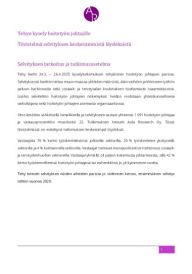Of the care work managers who responded to the survey, 42% said their unit or department had grown in the past year. The most common reasons for growth mentioned were the wellbeing services county reform and the merging of units. In practice, expanded units lead to more personnel, customers, processes and reporting responsibilities – tasks that require time and organising, and often new skills, as well.
As such, the volume of administrative work has increased. According to the survey, 66% of care work managers felt that the wellbeing services county reform increased their administrative workload. The number grew by three percentage points from the 2024 survey.
Care work managers include head nurses, service supervisors, and chief nursing officers, among others. They are responsible for planning, developing and managing care and nursing at various levels of their organisation. They are tasked with ensuring that the care work is high-quality, safe, ethically sustainable, and customer-oriented.
Ethical stress a key motive for changing careers
According to the survey, ethical stress has emerged as an especially significant reason for people to consider changing careers. As many as 47% of respondents reported ethical stress as their reason for wanting to change careers. This is five percentage points more than in the 2024 survey and ten points more than in the 2021 one.
In care work, ethical stress refers to the emotional and psychological stress caused by conflicts between professional values, ethical principles, and practical limitations.
Ethical stress was especially prevalent among first-line supervisors, such as head nurses and assistant head nurses. As many as 83% had thought about changing careers.
– Ethical stress is often related to everyday work situations where you have to constantly compromise between resources and the number of personnel. Such situations challenge professional and ethical principles and cause a mental workload that cannot be resolved by work arrangements alone, says Tehy President Millariikka Rytkönen.
Working overtime is commonplace for many managers. According to the survey, 78% of respondents had worked extra or overtime in the past three weeks. What is concerning is that 7% reported not receiving any overtime pay. Most of the unpaid work takes place in child welfare, rehabilitation, emergency medical services, administration, and services for people with disabilities.
– This suggests that the workload is not distributed fairly and people are not always paid what they deserve, Rytkönen states.
Participation in clinical work decreased
Even though managers often take on clinical tasks due to shortages of staff or resources, the survey shows that the number of managers who participate in clinical work has decreased from the previous survey. In 2025, only 47% participate in clinical work, whereas 50% did so in 2024, and as many as 58% in 2022.
– The results suggest that the focus of the work has shifted and administrative work has increased. On the one hand, it’s good news that care work managers are able to focus on management and administration, according to the survey. On the other hand, their workload has increased. It is essential to take care of the managers’ wellbeing at work. They play an increasingly significant role in the large merged units, says Tehy Director of Public Relations and Development Kirsi Sillanpää.
Does education provide sufficient professional skills?
The survey also examined the views of care work managers about the skills provided by education. Almost one in three respondents stated that education does not sufficiently provide the competencies needed at workplaces. Deficient competencies were reported in operating theatre activities and psychiatry, in particular.
The reasons for education shortcomings as highlighted by the respondents were workplaces’ and training locations’ excessive responsibility for teaching practical matters, deficient skills related to employment, and inadequate clinical skills.
– The results show that there is room for development in education and the connected training. Moving forward, we should focus especially on teaching clinical skills as a part of degree programmes. Clinical competencies not only support students’ readiness to work in demanding environments, but also support the development of their professional thinking and identity and strengthen their commitment to their future profession, Sillanpää says.
Tehy commissioned Aula Research to carry out the survey from 24 March to 26 April 2025 for care work managers who are members of Tehy. The survey received responses from a total of 1,091 care work managers. Of the respondents, 76% reported working in the public sector, 20% reported working in the private sector and 4% reported working in the third sector.
The survey explored the overtime worked, respondents’ thoughts about changing careers or returning to clinical work, and the competence level provided by education in the health and social welfare sector. In addition to these, the survey aimed to examine the views of care work managers concerning their role as societal influencers and their position in organisations.
Enquiries: Tehy Director of Public Relations and Development, Kirsi Sillanpää, tel. +358 40 820 7848, [email protected]


